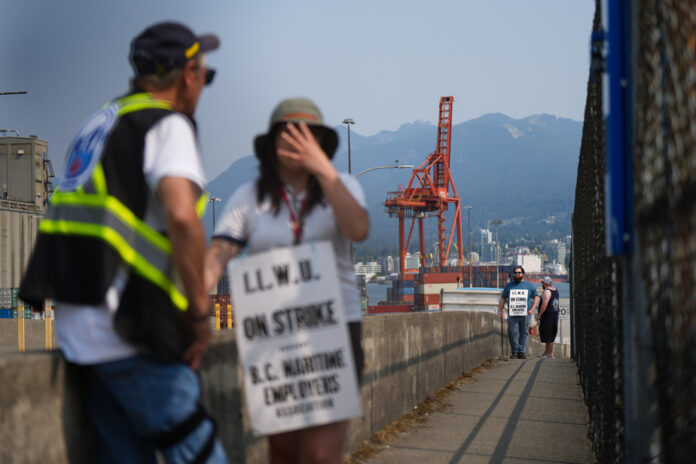(Vancouver) British Columbia maritime employers are proposing binding arbitration to end the province’s port strike after negotiations with the workers’ union stalled.
The British Columbia Maritime Employers Association (BCMEA) said in a statement Wednesday that billions of dollars worth of goods remain unsettled, disrupting critical supply chains and hurting relationships with international trading partners.
On the fifth day of the port strike, the association said that if the union, International Longshore and Warehouse Union (ILWU) Canada, agreed to binding arbitration, “port operations could resume quickly, essential goods could begin to flow again and there would be immediate stability and restoration of Canada’s supply chain operations.”
The association said it first proposed arbitration by way of mediation nearly three weeks ago, a process it said would be shaped by both parties and would only lead to a binding outcome. if necessary.
Talks between the employers’ association and the union broke down on Monday. More than 7,000 workers at 30 BC ports have been on strike since Saturday morning.
“Fourteen consecutive shifts and five days of the ILWU Canada strike have potentially disrupted 3.7 billion worth of goods — auto parts, refrigerated foods, fertilizers, critical minerals and goods that do not reach Canadians or our trading partners at abroad,” the association said.
A major North American railroad said it placed “temporary embargoes” on export traffic to the Port of Vancouver due to the strike.
Patrick Waldon of Canadian Pacific Kansas City (CPKC), formerly known as Canadian Pacific (CP), said the company is closely monitoring developments and is in direct communication with customers at subject of industrial action.
Mr. Waldon said in a statement that the railroad, formed when CP acquired Kansas City Southern earlier this year, wanted a “quick resolution” to protect North American supply chains and transport. economy of Canada.
He added that embargoes have been placed on the Port of Vancouver to “allow traffic to flow west while protecting the fluidity of the network.”
Both sides in the conflict said on Tuesday that maintenance issues were a sticking point in negotiations.
The union said its jurisdiction over maintenance was being eroded by the use of contractors, and the main problem was employers’ refusal to accept “a single sentence” of a maintenance document.
The employers’ association meanwhile said the union was trying to “aggressively expand” its control of maintenance tasks, far beyond an agreement which the association says is “legally well-established.” for decades “.
“Negotiations are still on hold, but the BCMEA is ready to re-engage at any time, provided ILWU Canada is prepared to submit a reasonable proposal,” the association said in an email Wednesday.
Business organizations as well as representatives from Alberta and Saskatchewan have called on Ottawa to intervene and end the strike, but federal Labor Minister Seamus O’Regan has said he wants that the union and the employers return to the bargaining table.















